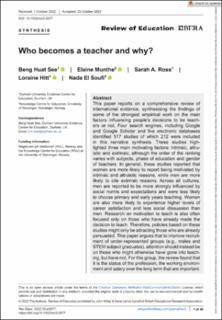| dc.contributor.author | See, Beng Huat | |
| dc.contributor.author | Munthe, Elaine | |
| dc.contributor.author | Ross, Sarah A. | |
| dc.contributor.author | Hitt, Loraine | |
| dc.contributor.author | El Soufi, Nada | |
| dc.date.accessioned | 2023-04-12T13:44:10Z | |
| dc.date.available | 2023-04-12T13:44:10Z | |
| dc.date.created | 2022-12-29T17:31:44Z | |
| dc.date.issued | 2022 | |
| dc.identifier.citation | See, B. H., Munthe, E., Ross, S. A., Hitt, L., & El Soufi, N. (2022). Who becomes a teacher and why?. Review of Education, 10(3), e3377. | en_US |
| dc.identifier.issn | 2049-6613 | |
| dc.identifier.uri | https://hdl.handle.net/11250/3062723 | |
| dc.description.abstract | This paper reports on a comprehensive review of international evidence, synthesising the findings of some of the strongest empirical work on the main factors influencing people's decisions to be teachers or not. Four search engines, including Google and Google Scholar and five electronic databases identified 517 studies of which 212 were included in this narrative synthesis. These studies highlighted three main motivating factors: intrinsic, altruistic and extrinsic, although the order of the ranking varies with subjects, phase of education and gender of teachers. In general, these studies reported that women are more likely to report being motivated by intrinsic and altruistic reasons, while men are more likely to cite extrinsic reasons. Across all cultures, men are reported to be more strongly influenced by social norms and expectations and were less likely to choose primary and early years teaching. Women are also more likely to experience higher levels of career satisfaction and less social dissuasion than men. Research on motivation to teach is also often focused only on those who have already made the decision to teach. Therefore, policies based on these studies might only be attracting those who are already persuaded. This paper argues that to improve recruitment of under-represented groups (e.g., males and STEM subject graduates), attention should instead be on those who might otherwise have gone into teaching, but have not. For this group, the review found that it is the status of the profession, the working environment and salary over the long term that are important. | en_US |
| dc.language.iso | eng | en_US |
| dc.publisher | Wiley | en_US |
| dc.rights | Navngivelse 4.0 Internasjonal | * |
| dc.rights.uri | http://creativecommons.org/licenses/by/4.0/deed.no | * |
| dc.title | Who becomes a teacher and why? | en_US |
| dc.type | Peer reviewed | en_US |
| dc.type | Journal article | en_US |
| dc.description.version | publishedVersion | en_US |
| dc.rights.holder | The authors | en_US |
| dc.subject.nsi | VDP::Samfunnsvitenskap: 200::Pedagogiske fag: 280 | en_US |
| dc.source.journal | Review of Education | en_US |
| dc.identifier.doi | 10.1002/rev3.3377 | |
| dc.identifier.cristin | 2098062 | |
| cristin.ispublished | true | |
| cristin.fulltext | original | |
| cristin.qualitycode | 1 | |

